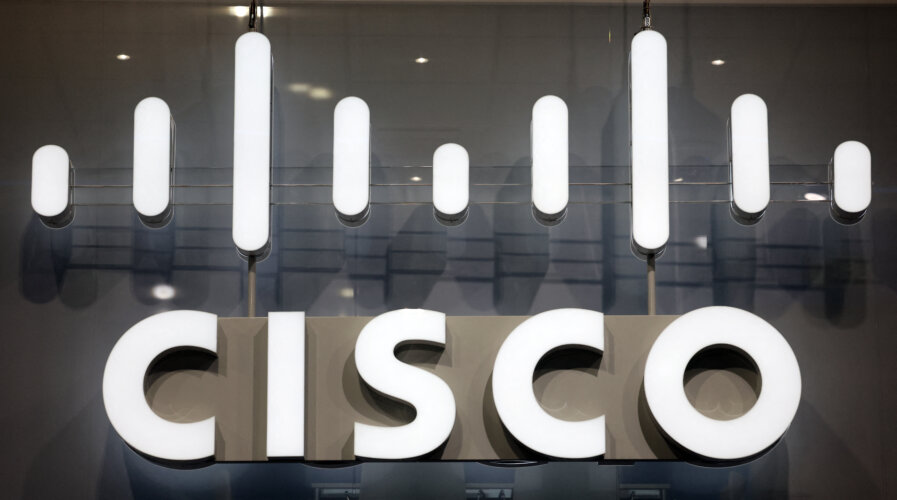
Cisco last week announced a US$28 billion deal to Splunk to strengthen its cybersecurity and observability play for enterprises.(Photo by Thomas COEX / AFP)
The largest deal made by Cisco is heating up the AI cybersecurity race. Here’s why
- Cisco last week announced a US$28 billion deal to acquire Splunk to strengthen its cybersecurity and observability play for enterprises.
- The deal would lead to Cisco and Splunk becoming one of the world’s largest software companies.
- Cisco expects the deal to accelerate both revenue growth and gross margin expansion.
In the last ten months or so, breakthroughs in technologies built on large language models have accelerated the arms race between hackers and companies. The upside is that while hackers are already deploying generative AI threats, cybersecurity firms are also scrambling to come up with better defenses. One prime example is the recent acquisition of Splunk by tech giant Cisco, solely to boost the latter’s software business with new AI-enabled security technology.
The US$28 billion acquisition is the largest deal in Cisco’s history, on top of the slew of recent acquisitions that company has made in the AI and software security space this year. The move essentially means Cisco is betting that Splunk’s data-crunching credentials can help fuel growth and attract new kinds of customers in the AI era.
“We’re excited to bring Cisco and Splunk together. Our combined capabilities will drive the next generation of AI-enabled security and observability,” Chuck Robbins, chair and CEO of Cisco, said in a statement announcing the deal. “From threat detection and response to threat prediction and prevention, we will help make organizations of all sizes more secure and resilient,” he added.
Frankly, Splunk’s data services have benefited from the boom in cloud computing and AI, and it provides the kind of customer relationships Cisco is looking for. That is why Robbins pitched the deal as a chance to strengthen Cisco’s offerings in markets that are growing quickly. As stated by Bloomberg, Robbins offered a premium of 31% over Splunk’s share price in cash — a transaction that’s equal to about 10% of Cisco’s US$216 billion market value.
The price jarred investors and according to Wedbush Securities’ analyst Dan Ives, the deal values Splunk at roughly six times its fiscal 2025 revenues. However, since Cisco is focused on the next generation of AI-enabled security and observability, Ives said Splunk’s well regarded unique platform makes this the right move at the right time. “We view this as a fair multiple for this strategic asset,” he wrote in a note last week.

Cisco announces its intent to acquire cybersecurity firm Splunk, making organizations more secure and resilient in an AI-powered world. Source: X.com
For context, founded in 2003, Splunk is a cybersecurity company that offers software to help businesses manage, monitor, and analyze machine-generated data to prevent hacks and fix technical issues. On the other hand, Cisco, founded in 1984, is a tech conglomerate focused on selling telecommunications and networking equipment, along with complementary software.
How will the deal beef up cybersecurity offerings by Cisco?
For starters, the acquisition builds on Splunk’s history of assisting organizations enhance their digital resilience and will help accelerate Cisco’s strategy “to securely connect everything to make anything possible,” the statement reads. “The combination of these two established leaders in AI, security and observability will help make organizations more secure and resilient,” Cisco said.
The networking giant reckons that the acceleration and adoption of generative AI, expanding threat surfaces, and multiple cloud environments, creates a level of complexity that is unlike anything organizations have faced. “Together, we will form a global security and observability leader that harnesses the power of data and AI to deliver excellent customer outcomes and transform the industry,” Gary Steele, president and CEO of Splunk said.
Steele also believes that uniting with Cisco represents the next phase of Splunk’s growth journey, accelerating the company’s mission to help organizations worldwide become more resilient, while delivering immediate and compelling value to shareholders.
“Factoring in the acceleration and adoption of generative AI, expanding threat surfaces, and multiple cloud environments, it creates a level of complexity that is unlike anything organizations have faced. Cisco and Splunk will address these challenges head on,” he added.
Specifically, Splunk’s security capabilities complement Cisco’s existing portfolio. “Cisco and Splunk’s complementary capabilities will provide observability across hybrid and multi-cloud environments enabling the company’s customers to deliver smooth application experiences that power their digital businesses,” Cisco’s statement reads.
Impact on growth
Cisco did state that the transaction is expected to be cash flow positive and gross margin accretive in the first fiscal year post close. Additionally, it is expected to accelerate Cisco’s revenue growth and gross margin expansion. Cisco’s Chief Financial Officer Scott Herren told Bloomberg in an interview that Splunk will bring in US$4 billion of recurring sales.
“That builds on the US$24 billion in recurring revenue that Cisco took in last year, out of a total of US$57 billion. That’s the benefit of having made this transformation “It gives us much more predictability and much more visibility into our results. And so it’s lower risk,” he said. While it isn’t clear whether there will be regulatory implications for this deal, Cisco says it hopes to complete by the third quarter of next year.
Wedbush’s Ives sees the acquisition as a “shot across the bow” of other cybersecurity firms, including Zscaler, Palo Alto Networks, and Crowdstrike, who will now have greater competition. He argued it may spark a “massive wave” of mergers and acquisitions over the next six to nine months in the broader tech space as larger firms compete in the AI and cyber security arms races.
READ MORE
- Safer Automation: How Sophic and Firmus Succeeded in Malaysia with MDEC’s Support
- Privilege granted, not gained: Intelligent authorization for enhanced infrastructure productivity
- Low-Code produces the Proof-of-Possibilities
- New Wearables Enable Staff to Work Faster and Safer
- Experts weigh in on Oracle’s departure from adland


